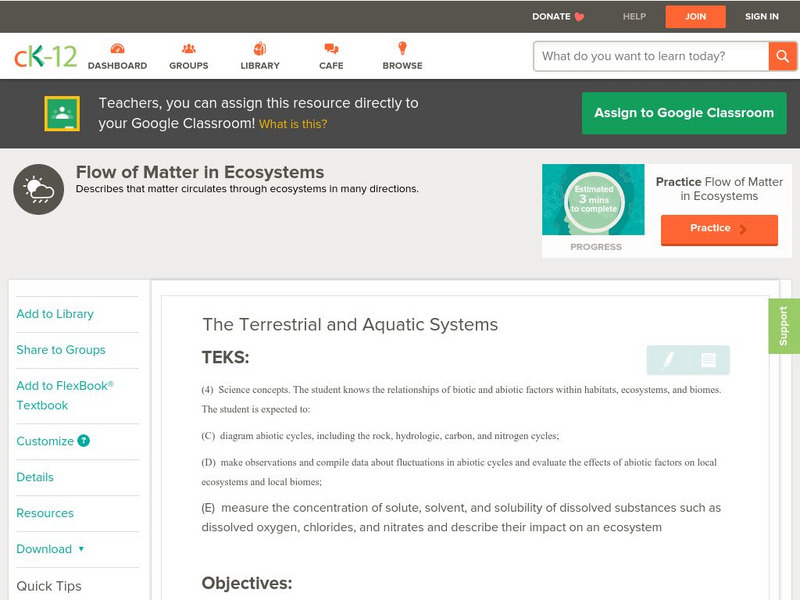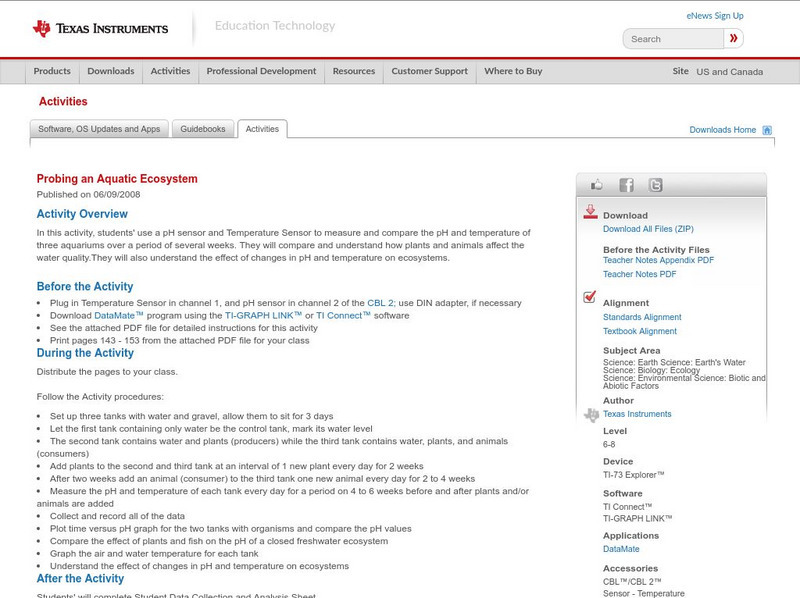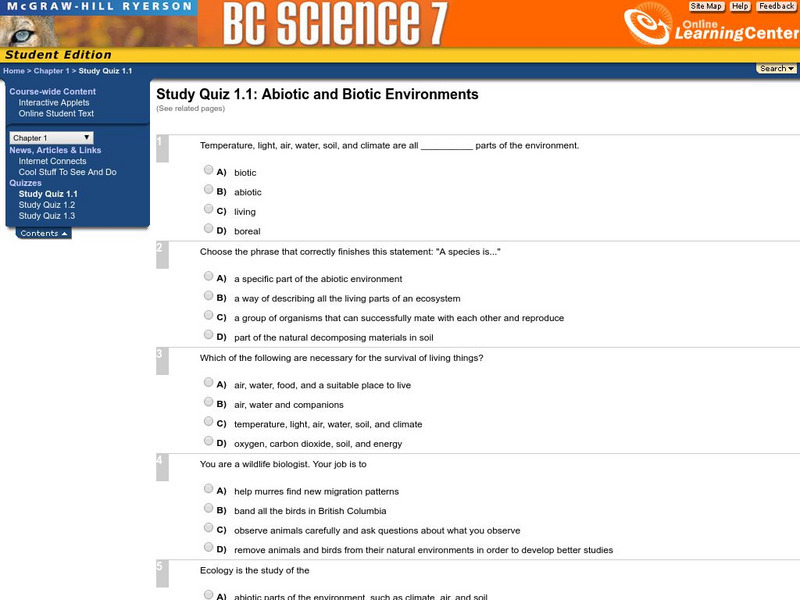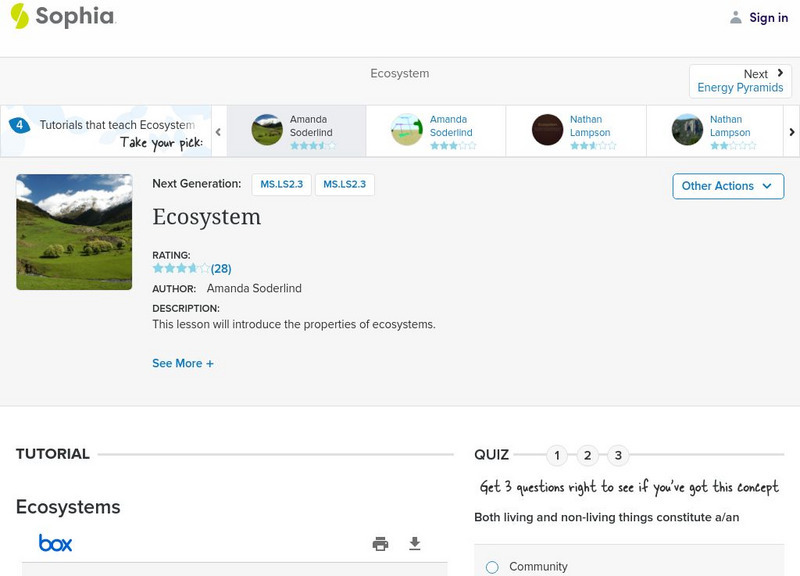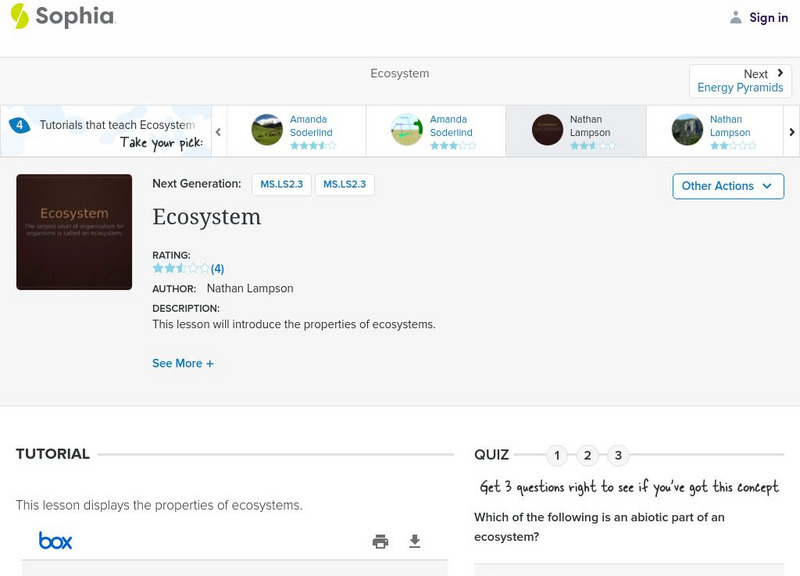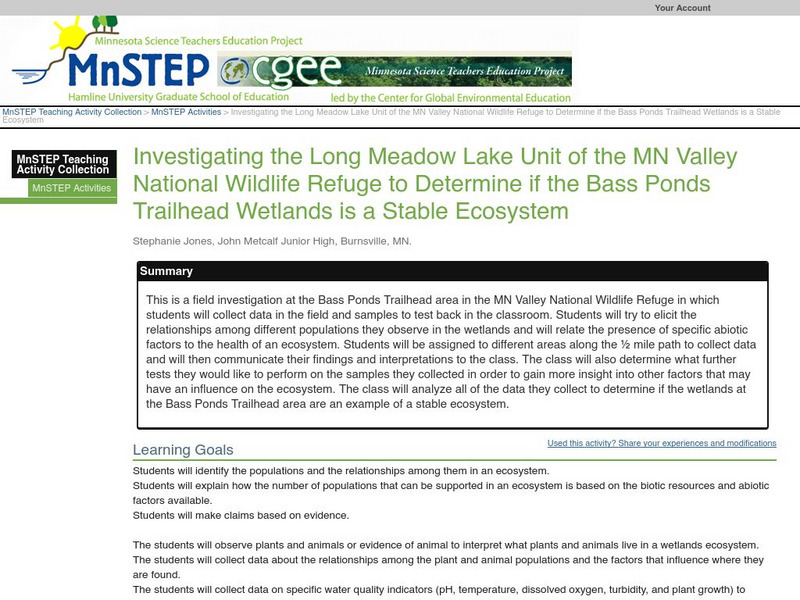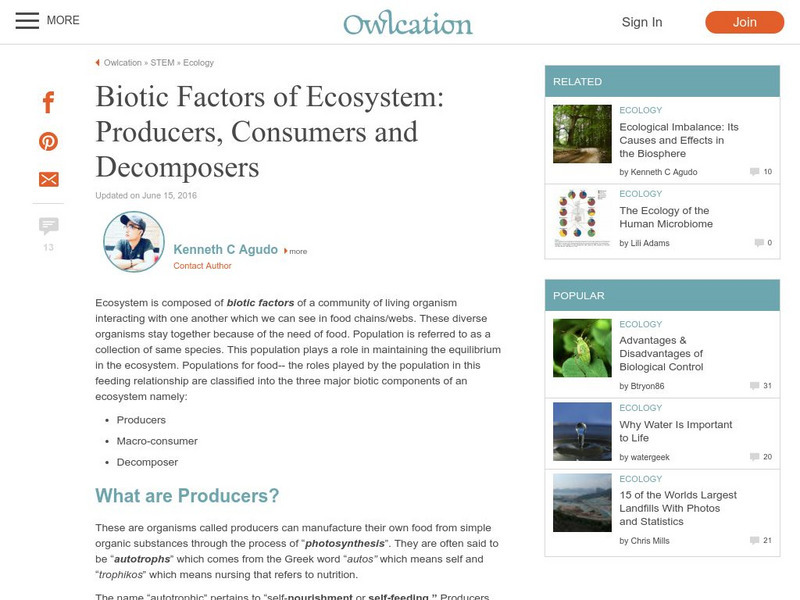Scholastic
Scholastic: Study Jams! Science: Ecosystems
A video and a short multiple-choice quiz on the topic of ecosystems, covering biotic and abiotic factors, and the roles organisms play in an ecosystem.
University of Michigan
University of Michigan: The Concept of the Ecosystem
Lesson looks at the definition of an ecosystem, biogeochemical cycles, and factors responsible for the differences between ecosystems.
CK-12 Foundation
Ck 12: Episd: What Are Biomes?
[Free Registration/Login may be required to access all resource tools.] Students will consider the influences that create different biomes. Recognize and classify the types of biomes.
CK-12 Foundation
Ck 12: Earth Science: Flow of Matter in Ecosystems
[Free Registration/Login may be required to access all resource tools.] In this module, students will learn about the cycles of nature (water, carbon, nitrogen, and phosphorus) that support the flow of nutrient matter through an...
CK-12 Foundation
Ck 12: Life Science: 12.10 Ecosystems
See how living and nonliving things exist together in an ecosystem.
McGraw Hill
Glencoe Online: Abiotic Factors
Take this 8 question check quiz on abiotic factors. The quiz is multiple choice.
Texas Instruments
Texas Instruments: Probing an Aquatic Ecosystem
In this activity, students' use a pH sensor and Temperature Sensor to measure and compare the pH and temperature of three aquariums over a period of several weeks. They will compare and understand how plants and animals affect the water...
Other
Hub Pages: Abiotic Factors: A Component of Ecosystem
In the environment, there are external factors that really affect organisms living within it. One of these factors is the set of abiotic factors, or nonliving variables, such as wind, ocean, day length, rainfall, temperature, and ocean...
McGraw Hill
Mc Graw Hill Ryerson: Abiotic and Biotic Environments
Take this ten question quiz on abiotic and biotic environments. The quiz is multiple choice.
Sophia Learning
Sophia: Abiotic and Biotic Factors: Lesson 4
This lesson will introduce abiotic and biotic factors, giving examples and comparing/contrasting the two. It is 4 of 4 in the series titled "Abiotic and Biotic Factors."
Sophia Learning
Sophia: Abiotic and Biotic Factors: Lesson 1
This lesson will introduce abiotic and biotic factors, giving examples and comparing/contrasting the two. It is 1 of 4 in the series titled "Abiotic and Biotic Factors."
National Geographic
National Geographic: Ocean Abiotic Factors
Students define and provide examples of abiotic and biotic factors of different ecosystems. Then they investigate the importance of abiotic factors and physical processes within ocean ecosystems.
Sophia Learning
Sophia: Ecosystem
A PowerPoint giving a basic definition of an ecosystem. Also explained with a definition and examples are abiotic and biotic factors of the ecosystem.
Sophia Learning
Sophia: Ecosystem: Lesson 1
This lesson will introduce the properties of ecosystems. It is 1 of 4 in the series titled "Ecosystem."
BiologyWise
Biology Wise: Facts About Autotrophs and Heterotrophs
Explains what autotrophs and heterotrophs are, the several types of each, their roles in an ecosystem's food chains, and the differences between them.
Science Education Resource Center at Carleton College
Serc: Investigating the Long Meadow Lake Unit of Valley Nat'l Wildlife Refuge
This is a field investigation at the Bass Ponds Trailhead area in the MN Valley National Wildlife Refuge in which middle schoolers will collect data in the field and samples to test back in the classroom. Students will try to elicit the...
National Geographic
National Geographic: Symbiotic Relationships in Marine Ecosystems
In this lesson students analyze videos to make observations about species, populations, and communities of organisms and discuss their symbiotic relationships. Then they create a hypothetical marine ecosystem and describe the adaptive,...
Other
Digital Library for Earth System Education: Teaching Box: Seasonal Upwelling
A suite of lessons focusing on the process of upwelling. Inquiry-based exploration of seasonal upwelling includes marine food webs, food production in the ocean, wind-driven ocean currents, and seasonal changes in biotic and abiotic...
Soft Schools
Soft Schools: Biodiversity Quiz (Ecological Problems)
Take an interactive quiz over ecological problems affecting the environment. After completing the quiz, check your score, and then revisit any incorrect question for further review.
Other
Hub Pages: Biotic Factors of Ecosystem: Producers, Consumers and Decomposers
An ecosystem is composed of biotic factors of a community of living organisms interacting with one another which we can see in food chains/webs. These diverse organisms stay together because of the need of food. Population is referred to...
Georgia Department of Education
Ga Virtual Learning: Ap Biology: Ecology
Students review the study of living things and make connections back to Earth's systems. This unit focuses on how various species, grouped in populations and communities, work with the nonliving things around them to ensure survival.
Khan Academy
Khan Academy: What Is Ecology?
A webpage giving an overview of ecology. Learn about the biotic and abiotic factors that make up an ecosystem as well as the different levels of ecology.
BBC
Bbc: Gcse Bitesize: Adaptations, Interdependence and Competition Aqa
The abundance and distribution of organisms in an ecosystem is determined by biotic and abiotic factors. Animals and plants have adaptations to allow them to compete for resources.
Untamed Science
Untamed Science: Biology: World Biomes: Lakes and Ponds Biome
Learn about the biotic and abiotic factors of lakes and ponds as well as learning how lakes form through reading and video clips.





